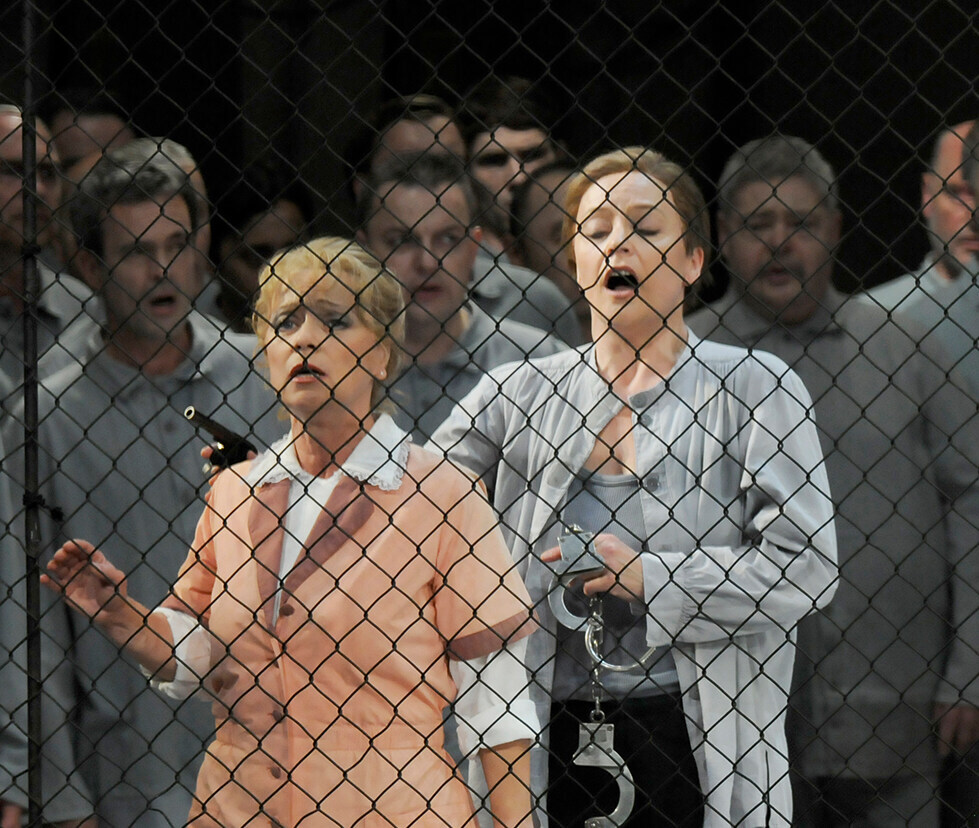First performed in Dresden in 1924, Richard Strauss’s Intermezzo provides all manner of insights into his turbulent married life.
A comedy with symphonic interludes in two acts
Libretto by the composer
Performed in German with German and English supertitles
Premiere
1. November 2024
Dates & Cast
- Conductor Patrick Hahn
- Staging Axel Ranisch
- Set Design Saskia Wunsch
- Costume Design Alfred Mayerhofer
- Lighting Design Fabio Antoci
- Video Falko Herold
- Choreography Michael Tucker
- Dramaturgy Jörg Rieker
- Conductor Patrick Hahn
- Staging Axel Ranisch
- Set Design Saskia Wunsch
- Costume Design Alfred Mayerhofer
- Lighting Design Fabio Antoci
- Video Falko Herold
- Choreography Michael Tucker
- Dramaturgy Jörg Rieker
- Christine Maria Bengtsson
- Hofkapellmeister Robert Storch Christoph Pohl
- Anna Ute Selbig
- Baron Lummer James Ley
- Der Notar Oleksandr Pushniak
- The Frau des Notars Sabine Brohm
- Ein Kapellmeister Jürgen Müller
- Ein Kommerzienrat Anton Beliaev
- Ein Justizrat Martin-Jan Nijhof
- Ein Kammersänger Tilmann Rönnebeck
- Resi Sofia Savenko
- Conductor Patrick Hahn
- Staging Axel Ranisch
- Set Design Saskia Wunsch
- Costume Design Alfred Mayerhofer
- Lighting Design Fabio Antoci
- Video Falko Herold
- Choreography Michael Tucker
- Dramaturgy Jörg Rieker
- Christine Maria Bengtsson
- Hofkapellmeister Robert Storch Christoph Pohl
- Anna Ute Selbig
- Baron Lummer James Ley
- Der Notar Oleksandr Pushniak
- The Frau des Notars Sabine Brohm
- Ein Kapellmeister Jürgen Müller
- Ein Kommerzienrat Anton Beliaev
- Ein Justizrat Martin-Jan Nijhof
- Ein Kammersänger Tilmann Rönnebeck
- Resi Sofia Savenko
- Conductor Patrick Hahn
- Staging Axel Ranisch
- Set Design Saskia Wunsch
- Costume Design Alfred Mayerhofer
- Lighting Design Fabio Antoci
- Video Falko Herold
- Choreography Michael Tucker
- Dramaturgy Jörg Rieker
- Christine Maria Bengtsson
- Hofkapellmeister Robert Storch Christoph Pohl
- Anna Ute Selbig
- Baron Lummer James Ley
- Der Notar Oleksandr Pushniak
- The Frau des Notars Sabine Brohm
- Ein Kapellmeister Jürgen Müller
- Ein Kommerzienrat Anton Beliaev
- Ein Justizrat Martin-Jan Nijhof
- Ein Kammersänger Tilmann Rönnebeck
- Resi Sofia Savenko
- Conductor Patrick Hahn
- Staging Axel Ranisch
- Set Design Saskia Wunsch
- Costume Design Alfred Mayerhofer
- Lighting Design Fabio Antoci
- Video Falko Herold
- Choreography Michael Tucker
- Dramaturgy Jörg Rieker
- Christine Maria Bengtsson
- Hofkapellmeister Robert Storch Christoph Pohl
- Anna Ute Selbig
- Baron Lummer James Ley
- Der Notar Oleksandr Pushniak
- The Frau des Notars Sabine Brohm
- Ein Kapellmeister Jürgen Müller
- Ein Kommerzienrat Anton Beliaev
- Ein Justizrat Martin-Jan Nijhof
- Ein Kammersänger Tilmann Rönnebeck
- Resi Sofia Savenko
- Conductor Patrick Hahn
- Staging Axel Ranisch
- Set Design Saskia Wunsch
- Costume Design Alfred Mayerhofer
- Lighting Design Fabio Antoci
- Video Falko Herold
- Choreography Michael Tucker
- Dramaturgy Jörg Rieker
- Christine Maria Bengtsson
- Hofkapellmeister Robert Storch Christoph Pohl
- Anna Ute Selbig
- Baron Lummer James Ley
- Der Notar Oleksandr Pushniak
- The Frau des Notars Sabine Brohm
- Ein Kapellmeister Jürgen Müller
- Ein Kommerzienrat Anton Beliaev
- Ein Justizrat Martin-Jan Nijhof
- Ein Kammersänger Tilmann Rönnebeck
- Resi Sofia Savenko
- Conductor Patrick Hahn
- Staging Axel Ranisch
- Set Design Saskia Wunsch
- Costume Design Alfred Mayerhofer
- Lighting Design Fabio Antoci
- Video Falko Herold
- Choreography Michael Tucker
- Dramaturgy Jörg Rieker
- Christine Maria Bengtsson
- Hofkapellmeister Robert Storch Christoph Pohl
- Anna Ute Selbig
- Baron Lummer James Ley
- Der Notar Oleksandr Pushniak
- The Frau des Notars Sabine Brohm
- Ein Kapellmeister Jürgen Müller
- Ein Kommerzienrat Anton Beliaev
- Ein Justizrat Martin-Jan Nijhof
- Ein Kammersänger Tilmann Rönnebeck
- Resi Sofia Savenko
Related event
In brief
What does it feel like when, in an instant, your life is turned upside down? That’s what happens to Christine, the wife of court music director Robert Storch. A misdelivered letter leads her to believe that her husband is betraying her in a most shameful manner. She goes on an emotional rollercoaster ride, and the story seems to be veering towards a tragic end ...
After finishing the complex opera „Frau ohne Schatten“, Richard Strauss wished to work on a thoroughly realistic subject; he wanted the stage filled with the lives of real people. What could be easier than to dramatise an incident from his own turbulent married life, namely a piquant misunderstanding that led to a veritable marital crisis in the Strauss household. In short scenes that flash by almost cinematically, Richard Strauss draws a portrait of his wife Pauline and his own artistic life with a sure instinct for uncovering the theatrical in the mundane. The numerous symphonic interludes offer a glimpse into the emotional lives of the characters.
This musical love letter to Richard Strauss’s wife is now to be staged 100 years after the Dresden premiere by Axel Ranisch, a director active in the fields of cinema, television and theatre, who is also a passionate lover of opera.

